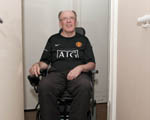 Go to main content
Go to main content
Archive Website of the UK government
Please note that this website has a UK government accesskeys system.
Main menu
Page menu
Money, tax and benefits

Disability Living Allowance - eligibility

You may be eligible for Disability Living Allowance if you have walking difficulties or need help with your personal care. You must have had these needs for three months and expect to need this help or have these difficulties for at least another six months.
If you have care needs
Already claiming DLA and want to report a change in your circumstances - find out more
To get the care component of Disability Living Allowance (DLA), your disability must be severe enough for you to either:
- need help with things such as washing, dressing, eating, getting to and using the toilet, or communicating your needs
- need supervision to avoid you putting yourself or others in substantial danger
- need someone with you when you are on dialysis
- be unable to prepare a cooked main meal for yourself (if you have the ingredients), if you are aged 16 or over
There are three rates of care component depending on how your disability affects you:
Lowest rate
If you need help for some of the day or you are unable to prepare a cooked main meal.
Middle rate
If you need help with personal care frequently or supervision continually throughout the day only, or help with personal care or someone to watch over you during the night only, or someone with you while you are on dialysis.
Highest rate
If you need help or supervision frequently throughout the day and during the night.
You can get Disability Living Allowance for your care needs even if no one is actually giving you the care you need, even if you live alone.
If you have mobility needs
To get the mobility component of Disability Living Allowance, your disability must be severe enough for you to have any of the following walking difficulties, even when wearing or using an aid or equipment you normally use:
- because of a physical disability, you are unable or virtually unable to walk without severe discomfort, or at risk of endangering your life or causing deterioration in your health by making the effort to walk
- you have no feet or legs
- you are assessed to be both 100 per cent disabled because of loss of eyesight and not less than 80 per cent disabled because of deafness and you need someone with you when you are out of doors
- you are severely mentally impaired with severe behavioural problems and qualify for the highest rate of care component
- you need guidance or supervision most of the time from another person when walking out of doors in unfamiliar places
- you are certified as severely sight impaired by a consultant ophthalmologist, and you were aged between 3 and 64 on 11 April 2011; you must also have a best corrected visual acuity of less than 3/60, or you must have a best corrected visual acuity of 3/60 or more but less than 6/60 together with a complete loss of peripheral visual field and a central visual field of no more than ten degrees in total
There are two rates of the mobility component depending on how your disability affects you:
Lower rate
If you need guidance or supervision out of doors.
Higher rate
If you have any of the other, more severe, walking difficulties.
You may be entitled to only the care component or only the mobility component, or you may be entitled to both.
If you are claiming for a disabled child
Your child must need a lot more help or supervision than other children of the same age.
You can claim for care needs before a child is aged three months. However, benefit will not be paid before the child reaches the age of three months unless they are paid under 'special rules' (see below).
You can claim for mobility needs from age three, if your child:
- is unable, or virtually unable, to walk
- would be at risk if they tried to walk
Special rules - if you are terminally ill
If you have a progressive disease and are not reasonably expected to live for more than six months, you can get DLA more quickly. You can get the highest rate of the care component whatever your care needs are. And you can get the care component and (if you meet the conditions) the mobility component, without waiting three months.
You can make a claim for someone under the special rules without them knowing or without their permission. If they satisfy the relevant conditions, they will get a letter saying that they have been awarded Disability Living Allowance. Special rules will not be mentioned in the letter.
To claim under these special rules you will need to:
- complete a Disability Living Allowance claim form
- get a separate completed form DS1500 from your doctor, specialist or consultant to send with it
You can find out more about caring for someone who is terminally ill in the 'caring for someone' section.
Your circumstances
Your entitlement to Disability Living Allowance and the amount you get is based on the information you told the Disability and Carers Service (DCS). If this information changes, it is your responsibility to tell the DCS. They can then check you're still entitled to the benefit and whether you're getting paid the correct amount.
If you are not sure what changes you need to tell DCS about, please read Disability Living Allowance – your circumstances.
 Facebook
Facebook Twitter
Twitter StumbleUpon
StumbleUpon Delicious
Delicious Reddit
Reddit